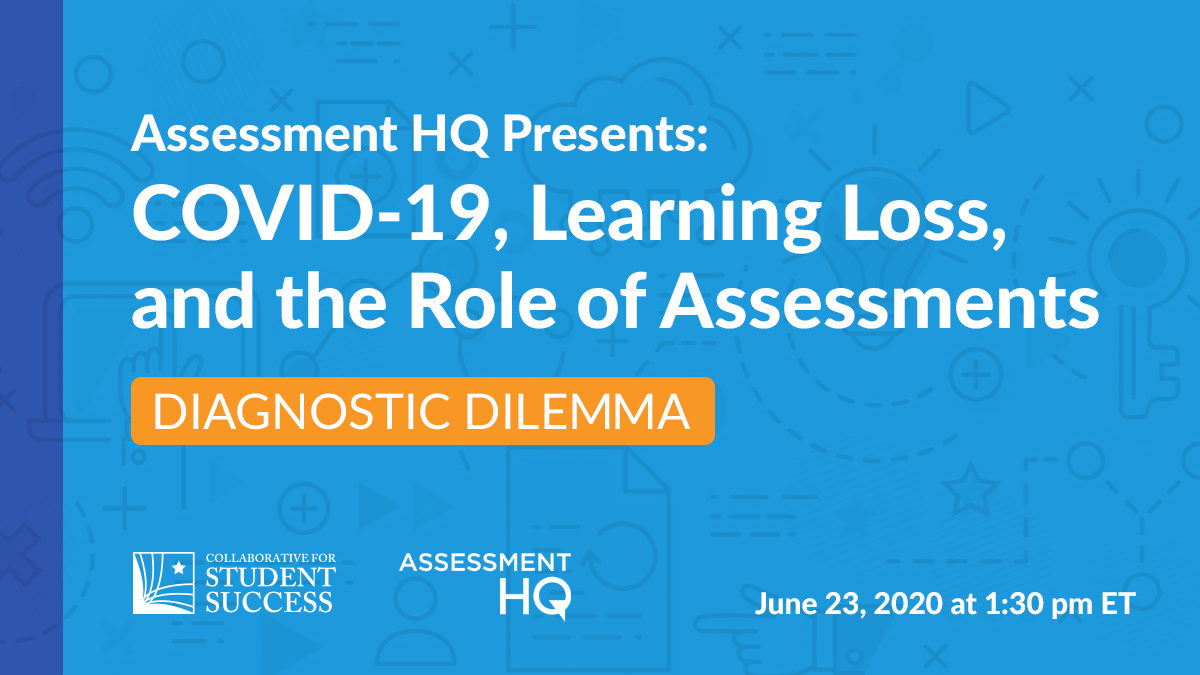RECAP: Assessment HQ Presents Summative Spring – June 30, 2020

Amid an unpredictable pandemic, uncertainty around schools reopening, and attempts by a few states to begin waiving standardized assessments for the 2020-21 school year, what is the future of America’s testing landscape?
The final event in the Assessment HQ online series, Summative Spring, largely focused on this question, with insightful discussion between Testing 1-2-3’s Dale Chu, former Delaware Governor Jack Markell, Senior Fellow with FutureEd Lynn Olsen, and Senior Vice President for Partnership and Engagement at the Education Trust, Denise Forte.
Chu began by guiding the panelists through their perspectives on the assessment conversation prior to the onset of the COVID-19 pandemic. Governor Markell and Olsen agreed that a focus on “over-testing” had become a steady drumbeat in both parties, even though, as the Governor noted, educators increasingly supported and found value in using testing data to inform instruction, individualize learning, and improve their craft. Forte noted that since the days of No Child Left Behind, many in the education community struggled to develop the “right handle on the framing and narrative about assessments,” which only makes it more difficult to convey the special value that student assessment data could bring to schools as they reopen.
As some states begin grappling with the idea of suspending state assessments for the 2020-21 school year, panelists urged policymakers and education officials to remember “the reason we have these testing systems” in the first place. Forte noted that “parents, regardless of race or income-level, want to know how their kids are performing, but also want to know how the system is performing. This is what we’re getting at with testing, how are students being served across the spectrum,” asserting that “standardized assessment systems allow us to do, is to look at these considerations systemically.” Olsen called attention to the nationwide, bipartisan desire to see how education systems are performing, particularly to address “concerns that students of color, low-income students [and others] weren’t receiving equitable access to educational resources.” All agreed that during the pandemic these “inequities are still absolutely with us.”
The panelists suggested states consider additional waivers cautiously. As Forte stated, each year of data lost represents significant “data on how public education systems are serving kids.” To emphasize the impact on losing such powerful information, Forte highlighted examples of schools, districts, and states who have used their data to create real, meaningful improvements for students and families.
In conclusion, the panelists each offered up a bit of advice to education stakeholders and officials. Markell said, “We know how difficult this moment of time is for our students, their families, teachers, and schools, but at the same time we know how important honesty is to these same people – honesty in the assessments to be honest about how they are doing academically. Not a political or partisan debate, but us putting our minds together to say how do we meet the moment?”
Olsen pointed to the need for improvement: “We do need a better-balanced assessment system. But the pandemic has taught us that abandoning data doesn’t make tackling an issue any easier. Now more than ever we need good data on how our students are doing, socially and emotionally and academically in order to thrive.”
And Forte urged participants to see how assessment data can help us meet the moment: “We are certainly at another point in our history where we’re facing multiple challenges at once and our biggest concern is that we keep things focused on students, how we narrow and address learning and opportunity gaps. Tests alone won’t address the gap, but they are important to obtaining educational equity. It’s the information we need so all students can succeed.”
To view the full recording of the Summative Spring webinar, click below:
About the Collaborative for Student Success
At our core, we believe leaders at all levels have a role to play in ensuring success for K-12 students. From ensuring schools and teachers are equipped with the best materials to spotlighting the innovative and bold ways federal recovery dollars are being used to drive needed changes, the Collaborative for Student Success aims to inform and amplify policies making a difference for students and families.
To recover from the most disruptive event in the history of American public schools, states and districts are leveraging unprecedented resources to make sure classrooms are safe for learning, providing students and teachers with the high-quality instructional materials they deserve, and are rethinking how best to measure learning so supports are targeted where they’re needed most.

